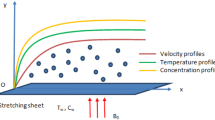Abstract
This study is dedicated to a micropolar porous body, including voidage time derivative among the independent constitutive variables. We formulate a heat-flux theory in this context taking into account a new set of state variables that includes the heat-flux vector and an evolution equation for it. The mixed initial boundary value problems have the specific feature that the governing system of equations consists of hyperbolic field equations only. Consistency of the theory is supported by a result of uniqueness.
Similar content being viewed by others
References
Nunziato JW, Cowin SC (1979) A nonlinear theory of elastic materials with voids. Arch Ration Mech Anal 72:175–201
Cowin SC, Nunziato JW (1983) Linear elastic materials with voids. J Elast 13:125–147
Iesan D (1984) A theory of thermoelastic materials with voids. Acta Mech 60:67–89
Eringen AC (2003) Micropolar mixture theory of porous media. J Appl Phys 94(6):4184–4190
Iesan D, Quintanilla R (2013) Non-linear deformations of porous elastic solids Int. J Non-Linear Mech 49:57–65
Marin M (2009) On the minimum principle for dipolar materials with stretch. Nonlinear Anal R W A 10(3):1572–1578
Marin M, Stan G (2013) Weak solutions in elasticity of dipolar bodies with stretch. Carpath J Math 29(1):33–40
Marin M, Agarwal RP, Mahmoud SR (2013) Nonsimple material problems addressed by the Lagrange’s identity boundary value problems, 2013. Art. Id. 135: doi:10.1186/1687-2770-2013-135
Marin M, Agarwal RP, Mahmoud SR (2013) Modeling a microstretch thermoelastic body with two temperatures, Abst Appl Anal, ID 583464, 7 p., doi:10.1155/2013/583464 (2013)
Marin M, Florea O (2014) On temporal behaviour of solutions in thermoelasticity of porous micropolar bodies. Ann Sci Univ Ovidius Ser Math 22(1):169–188
Sharma K, Marin M (2014) Reflection and transmission of waves from imperfect boundary between two heat conducting micropolar thermoelastic solids. Ann Sci Univ Ovidius Ser Math 22(2):151–175
Singh SS (2013) Transverse wave at a plane interface in thermo-elastic materials with voids. Meccanica 48(1):617–630
Mller I, Ruggeri T (1998) Rational extended thermodynamics. Springer, New York
Jou D, Casas-Vazquez J, Lebon G (2010) Extended irreversible thermodynamics, 4th edn. Springer, Berlin
Lebon G, Jou D, Casas-Vazquez J (2008) Understanding nonequilibrium thermodynamics: foundations, applications, frontiers. Springer, Berlin
Lebon G (1982) A generalized theory of thermoelasticity. J Tech Phys. 23:37–46
Lebon G (2014) Heat conduction ant micro and nano scales: a review through the prism of extended irreversible thermodynamics. J Non-Equilib Thermodyn 39:35–58
Cimmelli VA (2009) Different thermodynamic theories and different heat conduction laws. J Non-Equilib Thermodyn 34:299–333
Alvarez FX, Jou D, Sellitto A (2010) Pore-size dependence of the thermal conductivity of porous silicon: a phonon-hydrodynamic approach. Appl Phys Lett 97:033103
Acknowledgments
Author is very thankful to the referees for their valuable criticism, comments and help in improvement of the manuscript.
Author information
Authors and Affiliations
Corresponding author
Rights and permissions
About this article
Cite this article
Marin, M. An approach of a heat-flux dependent theory for micropolar porous media. Meccanica 51, 1127–1133 (2016). https://doi.org/10.1007/s11012-015-0265-2
Received:
Accepted:
Published:
Issue Date:
DOI: https://doi.org/10.1007/s11012-015-0265-2




